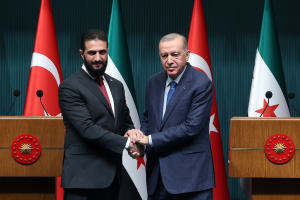The emirates solution for Gaza

As Israel determines the future governance of Gaza following its military campaign against Hamas, a proposal has emerged from Dr. Mordechai Kedar, an Israeli scholar and expert in Arab affairs, suggests implementing an "Emirates solution" – a governance model based on the successful example of the United Arab Emirates (UAE) and adapted to Gaza's tribal social structure.
The United Arab Emirates present an example of successful Arab governance. Formed in 1971, the federation of seven emirates has achieved stability and prosperity by working with, rather than against, traditional tribal structures. Each emirate maintains autonomy while participating in a broader federal framework that provides common defense and foreign policy.
What characterizes the UAE approach is its recognition that tribal affiliations remain the fundamental structure of Arab society. Rather than attempting to impose Western-style democracy, the UAE has relied on existing tribal networks and leadership structures. This approach has helped the Emirates become a bulwark against Islamic extremism in the region.
The UAE has actively worked to counteract radical interpretations of Islam through educational reforms, promoting moderate religious discourse, and establishing legal frameworks to combat extremism. In 2016, the country created a Ministry of Tolerance specifically focused on fostering cultural and religious coexistence. This combination of traditional tribal governance with modern, moderate policies has produced stability.
Gaza's social structure, like much of Arab society, remains fundamentally tribal. Dr. Kedar proposes dividing Gaza into five emirates based on its traditional districts: Beit Lahia, Beit Hanoun, Gaza City, Khan Yunis, and Rafah. Each would be governed autonomously by its dominant local clan, similar to how the UAE's individual emirates function.
This approach would work with, rather than against, Gaza's existing social fabric. Rather than attempting to impose a centralized Palestinian Authority or maintain Hamas's iron grip, the emirates solution would distribute power among local tribal leaders who already have legitimate authority within their communities.
Israel has the legal right to implement the plan and has sovereignty over Gaza. Israel’s legitimate legal position stems from the principle of uti possidetis juris – the doctrine that new states inherit the borders of the last top-level administrative unit that preceded them. In Israel's case, this was the British Mandate for Palestine. When Israel declared independence in 1948, it inherited the Mandate's borders under this principle. Jordan's subsequent occupation of the West Bank (1948-1967) did not confer sovereignty, just as Israel's recapture of these regions in 1967 does not constitute an "occupation".
This legal framework gives Israel the authority to implement administrative arrangements in these regions. The 1993 Oslo Accords created a complex administrative regime with the Palestinian Authority, but this was a voluntary delegation of administrative authority by Israel, not a recognition of Palestinian sovereignty.
The emirates solution would have Israel maintaining security control over rural areas while allowing substantial autonomy to the urban emirates. Each emirate would manage its own civil affairs, including education, healthcare, and local governance. This arrangement would mirror aspects of the UAE model, where individual emirates maintain significant domestic autonomy while participating in the broader security framework.
The UAE could play a crucial role in implementing this plan. With its experience in governance, substantial financial resources, and growing ties with Israel through the Abraham Accords, the Emirates could provide both expertise and investment for Gaza's reconstruction. The UAE has already demonstrated its willingness to engage in regional stabilization efforts and has a track record of successful development projects.
Saudi Arabia's potential support for such a plan is possible. The relationship between Saudi Arabia and the UAE is complex but generally aligned. Both nations are pursuing more moderate versions of Islam and working to counter extremist influences. Saudi Arabia's recent normalization discussions with Israel suggest it might be receptive to creative solutions for Palestinian governance.
The Saudi Emirati relationship has grown increasingly close in recent years, with both countries coordinating regional security issues and economic initiatives. Their shared concern about Iranian influence and Islamic extremism creates a potential alignment of interests in supporting stability-focused solutions for Gaza.
The Emirates model could potentially be extended to Judea and Samaria (the West Bank), where tribal structures remain strong. Dr. Kedar suggests establishing eight emirates based on major urban centers, each governed by its dominant clan. This would allow for local autonomy while maintaining Israeli security control over rural areas.
The key advantage of this approach is its alignment with existing social structures. Rather than imposing artificial national frameworks, it would work through established tribal leadership networks that already command legitimate authority within their communities.
The critical question is whether Palestinians would welcome such an arrangement as an alternative to continued conflict. Recent polling suggests growing Palestinian disillusionment with both Hamas and the Palestinian Authority. The emirates solution could offer a middle path – maintaining Palestinian dignity and local autonomy while providing a framework for economic development and stability.
The success of the UAE model provides a powerful counter-narrative to extremist ideologies. The Emirates have demonstrated that Islamic societies can achieve prosperity and stability without involving radicalism. This example could appeal to the Palestinians seeking alternatives to endless conflict.
Implementation would face some challenges. Hamas and other militant groups would strongly oppose any arrangement that diminishes their power. The Palestinian Authority would resist the decentralization of its authority. Some tribal leaders might initially hesitate to participate.
However, the potential benefits are substantial. The emirates solution could provide local autonomy and dignity for Palestinian communities, economic development through UAE and potentially Saudi investment, and a framework for peaceful coexistence with Israel.

Aurthur is a technical journalist, SEO content writer, marketing strategist and freelance web developer. He holds a MBA from the University of Management and Technology in Arlington, VA.














